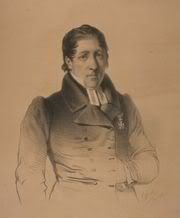I had hoped to interview one of my ex-Apostolic friends for this post. Unfortunately schedules did not permit and I'm moving to southern California in less than a week so I decided to just go for it. I still plan on interviewing someone, maybe around Christmas time and then posting it here. Out of all of the posts in the series, this one disappoints me for some reason but I wanted to post something to sum things up a bit.AuthorityThe basic authoritative documents for Apostolic Lutherans seem to be Luther's catechisms and the sermons of
Laestadius. The Apostle's Creed also seems authoritative but in the 1870's John
Takkinen, the
Laestadian leader of the time, inserted the words "in Gethsemane" after the words "He descended into Hell."
Apostolics would probably claim that the Bible is their ultimate source of authority but it is interpreted through the sometimes peculiar teachings of historic leaders in the
Laestadian movement. Here we will explore some distinctive features of Apostolic doctrine and practice.
ExclusivityProbably the most problematic theological distinctive of Old Apostolic Lutheranism is the belief that the Old Apostolic Lutheran Church is the one true church and that all those claiming to be Christians outside of their group are bound for hell. I have read that Old
Apostolics might believe that there are true believers in other places but that they would have to hold to the theology and practice
identical to the Old Apostolic Lutheran Church. It is also interesting to note that no evangelism is done by the group. They believe that if a person is to be saved that they will be drawn by God into their church.
Confession, Absolution and JustificationMy resources for writing this series offer conflicting definitions of Apostolic doctrine. A statement will often be made on a given subject that sounds good and orthodox. For instance, concerning salvation,
Saarnivaara states that
Apostolics believe that, "the only condition of salvation is faith and trust in the Gospel." That sounds good but the problems come in when the definition of "the Gospel" is explored. It seems that for
Apostolics, "the Gospel" is only to be found in Old Apostolic Lutheran churches and it must be expressed in confession to another believer and then absolution from that believer.
Based on their "Doctrine of the Keys," the Old
Apostolics believe that Christians (only Old
Apostolics) have the power to forgive sins and that without hearing the "word of reconciliation" in the preaching of the Apostolic church or by way of personal absolution a sinner cannot be forgiven. One source identifies the origin of this belief saying, "Careless statements of the elders, which equated the gospel with confession and absolution, contributed to the new focus and reliance on confession and absolution as the 'pilgrim’s staff,' which became the new savior or the sole method of purification from their occasional lapses into sin. Such persons could not appreciate a gospel that unlocks the gates of heaven for unworthy and totally depraved wretches by the preaching of the free, full and unconditional forgiveness of sins." After making a statement which suggests that Apostolic believers are the agents of justification,
Saarnivaara goes on to make a statement that seems to conflict with it. He says, "Confession of sins to a confessor is no meritorious work, and the believer is not justified by that, for he is already righteous in Christ." A paragraph later he says, "If someone has fallen into sin which is known to other people, private confession is not sufficient. In order that he may be known before the congregation as one who has repented of his sins and forsaken them, he should confess them publicly before the congregation.
Otherwise he cannot be cleansed and justified before the Church of Christ.[emphasis mine]" The act of personal absolution is actually a very emotional thing for
Apostolics. When I went to the Old Apostolic Lutheran revival service a few years ago, where elders from Lapland preached, I witnessed this confession and absolution which occurred before the
eucharist. People would embrace, confess sins while weeping and then obtain absolution.
It is unclear exactly how problematic the
Apostolic's "Doctrine of the Keys" really is. In affirming the importance of absolution, the
Apostolics join the Catholics, Orthodox and many Anglicans. If a Christian feels that they have lost their salvation each time their conscience is troubled by a sin and that they only regain salvation upon confession and the reception of absolution, then it seems that this doctrine is problematic. It would be interesting to explore more deeply historic doctrines of confession and absolution as in the Catholic Church and compare it to what
Apostolics believe. From my reading of my sources, I am very uneasy with the "Doctrine of the Keys" in Apostolic Lutheranism but some of that may be a Protestant bias which downplays the importance of confession and absolution.
 Church Government
Church GovernmentThe elders in
Gällivare in Swedish Lapland hold a place of authority in the Old Apostolic Lutheran Church. They are consulted on all important affairs. In American congregations, preachers are called from the laity. They have no trained or ordained ministers. Preachers in the church will call up others in the congregation to be preachers and from that point on, they are expected to preach and to counsel members. Apostolic preachers are expected to retain full-time jobs on top of their
responsibilities to the church to support their families.
What Went Wrong?How did the
Laestadian movement progress from a God-glorifying revival to a dead, legalistic, oppressive and heretical movement seen today in the Old Apostolic Lutheran Church? First of all it should be pointed out that there are different groups of
Laestadians and the theology and practice among those groups may be far less problematic than the situation in the Old Apostolic Lutheran Church. I believe that there were problems from the start, even at the time of
Laestadius. The strong emphasis on the doctrines of confession and absolution became problematic when a certain way of doing things became enshrined in the doctrine of Apostolic Lutheranism. I strongly believe
that we should confess our sins to one-another. I have seen the freedom and the deliverance both from guilt and from the continued desire to sin that comes through regular confession. It seems that in Apostolic Lutheranism, the good thing that is confession became problematic when it was turned into a formula which must always be followed and when justification became based on the confession of any sin which troubled the conscience. Another thing that seems to have led to some of the problems in Apostolic Lutheranism is a lust for power that was seen in some of the leadership in movement in North America at the time when the schisms occurred. It seems that the problems in the movement, which may have been present in Lapland became more acute among the American leadership.
Takkinen tried to control the movement by appealing to the elders in Lapland, which resulted in schism and the formation of the Old Apostolic Lutheran Church and
Matoniemi encouraged an extreme legalism with his preaching that all innovations were dangerous for Christians.
There are serious problems with the movement other than the problems of doctrine. I believe that the heretical doctrines contribute to the other problems seen. I have heard the allegation from multiple reliable sources that child sex-abuse is not uncommon in the Old Apostolic Lutheran Church. One reason for this is that it is always covered up. It is reported in one place that when a parishioner went to a preacher to report that her daughter had been molested, that the preacher told her not to go to the police.
Another problem not uncommon in sectarian fringe movements is that members of the church who decide to leave are shunned and shamed by continuing members. Leaving the Old Apostolic Lutheran Church is a difficult and traumatic experience and is best done with a support system outside of the church. I have witnessed one such exit where a young family left the church, came to live with other ex-
Apostolics and also joyfully embraced true and life-giving Christianity. The husband also lost his job because he worked for a company owned by
Apostolics.
Another thing which seems almost inconceivable to me is that there is reportedly little or no prayer life or Bible study outside of time in the church-service for Old
Apostolics. Prayer is always done in the context of the church and the church teaches that individuals cannot understand the Bible for themselves, it must be interpreted by one of the preachers. Individual time in the Word and in prayer has been for me the chief means to greater intimacy with my Creator. This one place where I whole-
heartedly embrace Reformation teaching, as Archbishop
Orombi has said, "Part of the genius of the Reformation was its insistence that the Word of God and the liturgy be in the language of the people—that the Bible could be read and understood by the simplest
plowboy."
ConclusionAfter all I have said about heresy and serious problems of practice in the Old Apostolic Lutheran Church, I want to reiterate that out of all of the
Apostolics I have known, I have never met one that I didn't like. When I was going to school in the Battle Ground School District I appreciated the friendship of a number of
Apostolics and now, nine years after graduating from high school, I still appreciate friendships with some ex-
Apostolics. Some of the greatest examples of Christian love I have seen have come from Christians who came out of Apostolic Lutheranism. The devotion to Christ I have seen among ex-
Apostolics has actually surprised me. It seems that the stereotypical ex-fundamentalist either completely abandons Christianity or embraces anti-Christian liberal "Christianity." This has not been the case among the ex-
Apostolics I know. I would certainly also not want to make the claim that there are no Christians within the Old Apostolic Lutheran Church. I know that there are and I can only hope and pray that a new move of the Holy Spirit will occur among these people which will free them from heretical doctrine and legalistic practice and will redeem the Old Apostolic Lutheran Church to be a force for God's Kingdom in the world, bringing sinners to salvation in Christ and releasing God's healing, liberating and sanctifying power into the lives of those who are bound.
Bibliography:Allworth, Louise McKay.
Battle Ground . . . In and Around. Battle Ground, WA: The Write Stuff Publishing, 2006.
Saarnivaara,
Uuras.
The History of the Laestadian or Apostolic Lutheran Movement in America. Ironwood, MI: National Publishing Co., 1947.
"
Laestadianism." http://en.wikipedia.org/wiki/Laestadian
"
Laestadians to the Present." http://www.apostolic-lutheran.org/history/present.html
"Lars Levi
Laestadius." http://en.wikipedia.org/wiki/Laestadius
"The Firstborn
Laestadianism." http://en.wikipedia.org/wiki/The_Firstborn_Laestadianism
Various articles at: http://users.erols.com/ewheaton/laest1.htm#juhani
Various articles at: http://www.oldapostoliclutheran.com/
 Almighty Father, in your love you made this land which I so love. You have blessed it with a special beauty which declares your glory. In your merciful providence you have put many in my path here who have pointed me to You and shown me your love. Lord bless Battle Ground and bring revival into this town so that every tongue here would confess that You are Lord. And bring me back to this place, O Lord, that I might once again recieve and give love and blessings to these brothers and sisters.
Almighty Father, in your love you made this land which I so love. You have blessed it with a special beauty which declares your glory. In your merciful providence you have put many in my path here who have pointed me to You and shown me your love. Lord bless Battle Ground and bring revival into this town so that every tongue here would confess that You are Lord. And bring me back to this place, O Lord, that I might once again recieve and give love and blessings to these brothers and sisters.

















